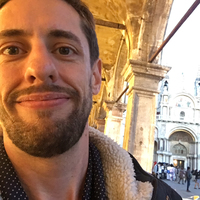Dr. Matthew Pelowski

Dr. Pelowski is currently a senior postdoc within the EVA Lab. His academic work is specifically focused on the topic of empirical study of profound art and museum experience. He developed the first theoretical model of transformative art experiences (Pelowski & Akiba, 2011), extending from Prof. Leder’s earlier work, and has since refined this in a major new update, leading to the main theoretical model and empirical behavioral measures (Pelowski, Leder et al., 2017) which will serve as the basis for this project’s empirical WPs. He has published over 40 papers in leading journals, including important empirical studies of art experiences in museums throughout Japan, North America, and Europe. He has also published major reviews on best practice in museum study (Pelowski et al., 2017) and pioneering work detailing new behavioral and physiological methods for documenting and uncovering ecologically-valid, museum art experience. He also spearheaded the empirical studies and research collaborations employing Network modelling and latent class analysis for data- driven methods of quantifying varieties of art experience, and co-developed and has been running the Archive of Art Experiences Project which will also be extended in the present program.
He has further worked to expand his repertoire to investigations of art and the brain, first as a postdoc at the Nagoya University, Laboratory of Cognitive Informatics, one of the first laboratories to utilize fNIRS technology, which he applied to art-viewing. He has published multiple empirical and theoretical papers on fNIRS, as well as hyperscanning, and spearheaded (with his collaboration partners) the state-of-the-art analytical approaches which will be employed here. From 2015-2017 he also led a Marie Curie project to integrate causative (tDCS) and brain imaging methods with the study of art. In addition, he has developed projects and papers regarding the relation of art engagement to social factors, empathy, and/or perspective taking, mobile eye and movement tracking in museums. He was recognized with the Baumgarten Award for outstanding contributions by young scientists by the International Association of Empirical Aesthetics (2016). He also has experience in large projects focused on societal challenges-for example assessing social, cultural, and infrastructural factors underlying media and technology use, or factors and solutions for modulating parent decisions to register new-born children in Kenya.
Relevant (selected) publications
1.) Pelowski, M., et al (2018). Do you feel like I do? A study of spontaneous and deliberate emotion sharing and understanding between artists and perceivers of Installation art. Psychology of Aesthetics, Creativity, and the Arts.
2.) Pelowski, M., et al (2018). Capturing aesthetic experiences with Installation Art: An empirical assessment of emotion, evaluations, and mobile eye tracking in Olafur Eliasson’s ‘Baroque, Baroque!’ Frontiers in Psychology, 9 (1255), 1-22.
3.) Pelowski, M., Leder, H., et al (2017). Move me, astonish me... delight my eyes and brain: The Vienna Integrated Model of top-down and bottom-up processes in Art Perception (VIMAP) and corresponding affective, evaluative and neurophysiological correlates. Physics of Life Reviews, 21, 80-125.
4.) Pelowski, M., Leder, H., et al (2017). Beyond the Lab: An Examination of Key Factors Influencing Interaction with ‘Real’ and Museum-based Art. Psychology of Aesthetics, Creativity, and the Arts, 11(3), 245-264.
5.) Pelowski, M., & Akiba, F. (2011). A model of art perception, evaluation and emotion in transformative aesthetic experience. New Ideas in Psychology, 29(2), 80-97.
Relevant (selected) projects and activities
1.) Co-PI, EU, Marie Curie, Horizon 2020 - Research and Innovation Framework Programme. Incoming Fellowship, Standard EF, 655379. “Art and Brain: An integrated approach to causative analysis of neural function in perception of art using Transcranial Magnetic Stimulation.” (2015-17). (with Dr. Helmut Leder).
2.) Co-PI, “Aesthetics and self development.” Copenhagen University, Department of Psychology, general research fund (2014-2015). (with Dr. Tone Roald).
3.) PI, “Psychological and social processes in aesthetic experience.” Japanese Ministry of Education, Culture, Sports, Science and Technology (Monbukagakusho) International Fellowship for Postgraduate Research. (2007-2010)
4.) Consortium Member, “Evaluating Methods of Aesthetic Enquiry Across Disciplines” International Leverhulme Network (http://www.aestheticnetwork.manchester.ac.uk/). (2015-2018)
5.) Co-Founder, President, “Sambaza Group, registered NGO (Nairobi, Kenya; Nagoya, Japan; Boston, USA) committed to researching and implementing educational and developmental interventions in developing African countries.
